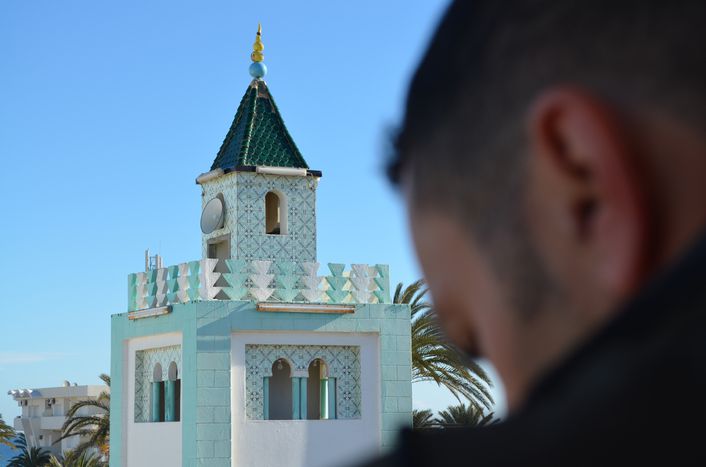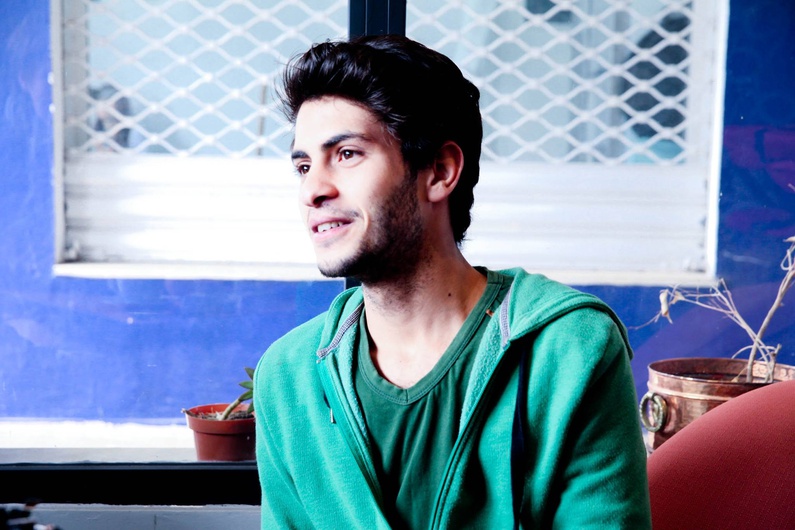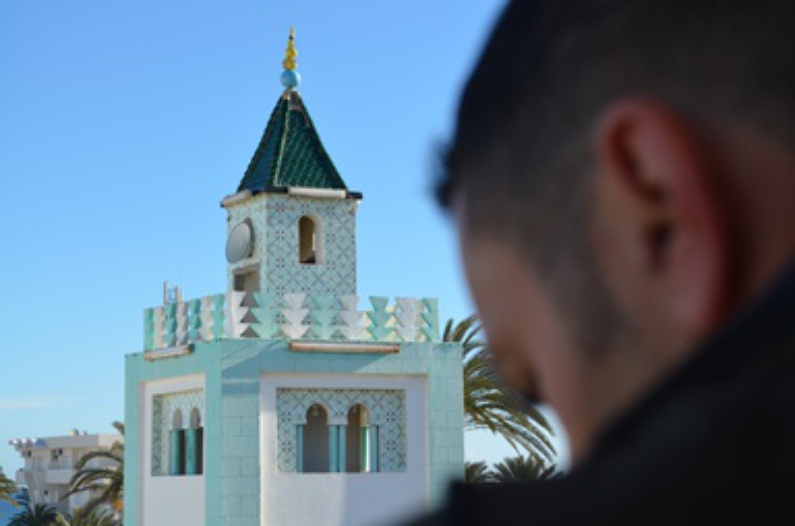
Queer in Tunisia: "What are you, a faggot?"
Published on
Translation by:
 Danny S.
Danny S.
They're young, queer and suffering. Three years after the Arab Spring, homosexuality and bisexuality remain a taboo, and in Tunisia, a crime. In spite of this the young, queer generation wants to fight for its rights. But what they lack is the solidarity, strategy and courage to start an influential movement.
It was a memorable moment in January 2011. During demonstrations against dictator Ben Ali, young Tunisians waved the Rainbow flag. The first time it had been done publically - a symbol of change. Ràm'y saved a photo of it on his notebook laptop. He shows it proudly in a café in Marsa, the chic district of Tunis. That other people might see it doesn't bother him at all, given that Marsa isn't a district in which he needs to hide. If you didn't know any better, you could imagine the café was in Paris or Berlin. The style is trendy and hip. The people are young, affluent and educated. The only difference is that a cool breeze sweeps across the terrace from the Mediterranean Sea.
 Here, Ràm'y sits, smokes and tells his story. His mother knows that he's gay. His father on the other hand doesn't. But he continues to live his life without letting that bother him. He posts photos and statuses on Facebook about what it means to be gay, bi or lesbian. He doesn't mince his words, even if most people are disturbed by what he says, leaving behind comments such as "what are you, a faggot?" "I want people to get used to it. With time homosexuality will become normalized," says Ràm'y. For a 20 year old, he speaks with a surprising level self-confidence. He has a lot planned in his life, and wishes for a future in which life will be made easier for queers in Tunisia. "I'd like a lot more possibilities for us: Gay Pride, self-help groups and more acceptance."
Here, Ràm'y sits, smokes and tells his story. His mother knows that he's gay. His father on the other hand doesn't. But he continues to live his life without letting that bother him. He posts photos and statuses on Facebook about what it means to be gay, bi or lesbian. He doesn't mince his words, even if most people are disturbed by what he says, leaving behind comments such as "what are you, a faggot?" "I want people to get used to it. With time homosexuality will become normalized," says Ràm'y. For a 20 year old, he speaks with a surprising level self-confidence. He has a lot planned in his life, and wishes for a future in which life will be made easier for queers in Tunisia. "I'd like a lot more possibilities for us: Gay Pride, self-help groups and more acceptance."
It centers around the future of those young people, whose sexual identity is met with scorn and contempt in Tunisia, from both the state and society. Despite the fact that article 204 of the constitution, which threatens gay sex with three years imprisonment, is rarely enforced, it reminds one of the possibility of being persecuated at any moment for being gay or bi. This is because in Tunisian society, being gay, as well as transsexual (Transsexual: Term for all people who don't identify with the ascribed socio-cultural gender roles of "women" or "men." Ed.), remains a taboo.
Marrying twice for the appearance of heterosexuality
Methi (name changed, Ed.) has also experienced this. He lives two and a half hours away from Tunis. He needs this distance from his family, he needs "room to breath." From his one-bedroom apartment he looks onto the beach of a tourist town on the eastern coast of Tunisia. On the walls of his apartment are oil paintings of lush, green forests. German forests. Methi loves Germany. For seven years he lived there and studied German philology. It was the most liberating time of his life, he explains. Now he's 35 years old. He's known since the time of puberty that he's bisexual, with a preference for men. Coming out of the closet back then, as well as now, wasn't even contemplated: "it's too dangerous." Under pressure from his family, he married the same woman twice, the same women with whom he's in the meantime had a child. Now he lives in the midst of his second divorce and is lonely.
 The Revolution had little impact on his life, as well as on those of other gay and bisexual Tunisians over the age of 30. "The situation wasn't difficult for homosexuals under Ben Ali, because they didn't pose a threat to his power," says Methi. In fact, he fears the situation will worsen, should the power of the conservative Salafi movement grow.
The Revolution had little impact on his life, as well as on those of other gay and bisexual Tunisians over the age of 30. "The situation wasn't difficult for homosexuals under Ben Ali, because they didn't pose a threat to his power," says Methi. In fact, he fears the situation will worsen, should the power of the conservative Salafi movement grow.
That's why the situation for Methi is clear; he'll marry again and lead a heterosexual life. In his opinion, however, young Tunisians will surely feel a change: "The internet has not only brought the Revolution here, but has also brought young, like-minded people together. That's a true revolution," he says.
bound to the pillory: the first queer magazine in dire straits
The World Wide Web is the place where queers network. The dating community Planetromeo brings men together, whether for sex, relationships or friendships. Many queers on Facebook have a second profile to organize and exchange ideas. Similarly, there are pages like Kelmty, Tunisia's first active online LGBT organization. Activists have also founded Tunisia's first queer magazine online; GayDayMagazine. However, after the initial launch, the site has only sparesly been updated. Ever since the former Tunisian Minister for Human Rights openly placed the magazine in the pillory, the founders have been living in fear. "The magazine changes its location almost every two months so that it won't be found," says Ali, a 25-year-old student.
Ali is involved in web admin for the magazine, in addition to being an active member of Amnesty International. He's one of the many young Tunisians who are strongly connected in the internet community, and who advocate widespread democratization. Instead of spending his evenings sitting in front of a tv, he's involved in discussion forums in alternative culture centers; but for his friends these places aren't for mere diversion. They want to collectively make a change, even in things related to queer rights. But that takes time. Ali waits for the "Bon moment," the right moment, to become active. That's what sets him apart from the others who hastily implemented intiatives following the revolution. "Everyone initiated something, all without knowing what exactly it was they wanted to achieve or how they would go about doing it."
Even within the community there is a lack of a sense of solidarity
In contrast, Ali acts outside the limelight. Up until now he's been analyzing possible strategies for the queer movement. He speaks with activists in other countries, garners advice, and tries to network with other gays. The latter is especially difficult. Many are afraid that their involvement would unavoidably result in an involuntary coming-out. Added to this is the fact that there isn't a clearly established community through which a common thread is woven. Sure, there are informational groups for gays and lesbians in different city districts of Tunis, but many of these are in opposition to each other. "If we can't establish solidarity among ourselves, then it will be difficult to obtain solidarity from outside," says Ali.
That's why for him, the queer movement still finds itself in an embryonic stage, three years after the Revolution. But time is running out. For many gays the situation will be similar to Methi's: forced marriages and public facades. The rule of taboos. Not a very promising outlook.
This article is part of the Euromed Reporter project, conducted in partnership with I WATCH and Search For Commong Ground and supported by the Foundation Anna Lindh.

Translated from Queer in Tunesien: „Bist du eine Schwuchtel, oder was?"


